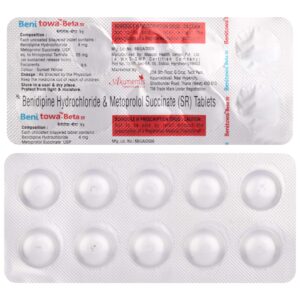METOPROLOL + BENIDIPINE
Metoprolol: Metoprolol is a medication that belongs to the class of drugs known as beta-blockers. It is commonly prescribed for the treatment of high blood pressure (hypertension), chest pain (angina), and to reduce the risk of heart attacks. Metoprolol can also be used to manage certain heart conditions, such as heart failure and abnormal heart rhythms (arrhythmias).
The primary mechanism of action of metoprolol is through its selective blockade of beta-1 adrenergic receptors, which are primarily found in the heart. By blocking these receptors, metoprolol reduces the effects of the stress hormone adrenaline on the heart, leading to a decreased heart rate, decreased force of contraction, and decreased oxygen demand.
The dose of metoprolol varies depending on the specific condition being treated and the individual patient’s response. The usual starting dose for hypertension is 50 mg once daily, which may be increased to a maximum dose of 200 mg daily if needed. For angina, the recommended starting dose is typically 100 mg once daily, which may also be increased if necessary. It is important to follow the dosage instructions provided by a healthcare professional.
Like any medication, metoprolol can cause side effects. Common side effects include fatigue, dizziness, slow heart rate (bradycardia), low blood pressure (hypotension), cold hands and feet, and stomach upset. Other potential side effects may include shortness of breath, difficulty sleeping (insomnia), depression, and sexual dysfunction. It is essential to consult a doctor if any concerning side effects occur.
It is worth noting that metoprolol may not be suitable for everyone. Individuals with certain medical conditions, such as asthma, heart block, or severe heart failure, may need to avoid taking this medication or use it with caution under medical supervision. Additionally, it is crucial to inform healthcare providers of any other medications or supplements being taken, as they may interact with metoprolol and cause adverse effects.
Benidipine: Benidipine is a calcium channel blocker that is primarily used to treat high blood pressure (hypertension). It belongs to the dihydropyridine class of calcium channel blockers.
Its mechanism of action involves blocking the entry of calcium ions into arterial smooth muscle cells and cardiac muscle cells. By inhibiting calcium influx, Benidipine relaxes and dilates the arterial blood vessels, reducing peripheral resistance and allowing blood to flow more easily. This leads to a decrease in blood pressure.
The usual recommended starting dose of Benidipine for hypertension is 2 mg per day, taken orally. The dosage may be increased gradually to a maximum of 8 mg per day based on the patient’s response to treatment. It can be taken with or without food, but consistency in administration is important.
Like other calcium channel blockers, Benidipine may cause certain side effects, with the most common being fluid retention in the lower limbs, headache, flushing, dizziness, and fatigue. Other possible adverse effects include peripheral edema, palpitations, shortness of breath, gastrointestinal disturbances (nausea, diarrhea, constipation), and skin rash. Side effects usually occur at the beginning of treatment and tend to resolve after a few days or weeks. However, if any side effect persists or worsens, it is important to consult a healthcare professional.
It is essential to discuss any other medications or medical conditions with a doctor before starting Benidipine, as it may interact with certain drugs or exacerbate certain conditions. Pregnant or breastfeeding women should also consult their healthcare provider before taking Benidipine.


